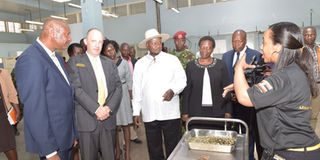Uganda registers Shs790b surplus in export revenue

President Museveni (with a hat) is shown gold samples during the launch of the first refinery in Uganda in February. Earnings from gold exports have since been increasing. PHOTO BY PPU
What you need to know:
Exports. Increased earnings were realised from gold and coffee
Kampala.
Increased earnings from certain commodity exports have helped Uganda to record a surplus on its balance of payments of $222 million (Shs790b) during the quarter ended February 2017.
This, according to the Central Bank, boosted the country’s foreign exchange reserves by a considerable margin.
In its monetary policy report released last week, Bank of Uganda (BoU) showed that the total stock of Uganda’s foreign exchange reserves stood at $3.17b (Shs11 trillion), an equivalent to 4.3 months of future imports of goods and services.
This, therefore, implies that the country can withstand exogenous shocks that may occur in the economy.
The executive director of research at BoU, Dr Adam Mugume, said last week: “There were increased earnings in coffee and gold exports that contributed to surplus in Uganda’s balance of payment.”
Despite the positive developments in the country’s balance of payments, the Central Bank cautions that in the short to medium term, the Current Account deficit might come under pressure from expected dividend payments which may be moderated by increased export receipts following the end of the dry season.
Other developments show that the Services Account balance deteriorated by $27m to a deficit of $152m on quarter to quarter (q-o-q) basis, largely due to a $16m decrease in receipts for other business services.
The report also shows that net inflows (liabilities) through the Financial Account increased by 41 per cent q-o-q to $376m mainly driven by developments in portfolio and other investments.
Due to the liberalised nature of Uganda’s economy, foreigners come to invest and get out at any time they fee like.
When they come in Uganda, they come with a view of making profit (high returns) on their investment they had put in a particular period of time.
The Central Bank statistics reveal that Portfolio investment recorded a net outflow (asset) of $149m ($5m in the quarter), due to a $126 million decrease in holdings of Uganda government debt securities by non-residents.
“Inflows through the financial account may increase due to project support loans to support the infrastructure and energy related projects and increased Foreign Direct Investment inflows,” said the Central Bank in the monetary policy report.




